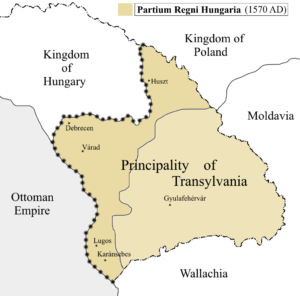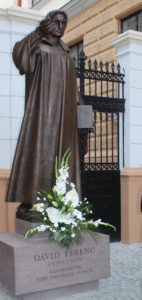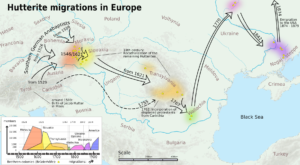13 January 1568: Freedom of religion was declared at the Diet of Torda

Religious tolerance in the Principality of Transylvania in the 16th century
The Religious Treaty of Augsburg in 1555 declared that whoever owned the land decided the religion. In Europe, there was only one established denomination in each country. “Freedom of religion” was an unknown idea. However, this was not the case in Transylvania. Since the time of King János Zsigmond, the Transylvanian state had always been more tolerant of religious issues than any Western Christian state.

In Transylvania, state power was based on the combined rule of the Hungarian nobility, the Saxons, and the Székelys. Transylvania couldn’t afford to risk religious hostility because of its delicate position between the Ottoman and Holy Roman Empires. In the 16th century, the Reformation spread like wildfire in Transylvania. By 1600, only a few aristocrats and the Hungarian Székelys remained Roman Catholics. The German Saxons became Lutherans, while the Helvetian faith was popular among the Hungarians in the Partium, near the Tisza River. Find out whether or not Transylvania was a mere vassal state of the Ottoman Empire:
https://www.hungarianottomanwars.com/essays/transylvanian-principality-a-vassal-state-of-the-turks/

In 1558, the Edict of Torda of the Transylvanian Diet declared the free practice of both Catholicism and Lutheranism. Calvinism, however, was forbidden. In 1564, Calvinism was included among the recognized religions. Ten years after the first law, in 1568, the same Diet, under the chairmanship of János Zsigmond, (elected but not crowned) King of Hungary and Prince of Transylvania, following the teachings of Dávid Ferenc, the founder of the Unitarian Church of Transylvania, extended freedom to all religions.
Dávid Ferenc, the founder of the Unitarian Church in Transylvania

Before going into the details of the Transylvanian Diet Edict, we must introduce Dávid Ferenc (cc1520-1579). His career is a typical example of the religious conversion fervor of the time. Dávid had Saxon roots (Franz Hertel was his original name), and he studied in Wittenberg and worked as a Catholic priest when he returned home. However, he soon joined the Lutheran movement of the Reformation. He was their bishop in 1557 but then became a follower of the Helvetic (Calvinist) faith. In 1564 he was elected bishop of the Reformed Church.

Moving on, he found his conscience goals in the Trinity-denying, i.e. anti-Trinitarian, religion founded by Szervét Mihály (a Spanish physician Miguel Serveto). They were later called Unitarians in Hungary (unus = one, referring to the one divine personality). As the court priest of prince János Zsigmond, he convinced his master of the new faith, so that the originally Catholic ruler agreed with the anti-Trinitarians on the Lutheran, then Calvinist religion. Following Dávid’s work, half of the Hungarians of Kolozsvár (Klausenburg, Cluj) and, in the 1580s, the whole of Transylvania adopted these views. A printing press and a college were established in the capital, and Transylvania welcomed the followers of the more radical beliefs who had been expelled from all over Europe. Read an article about the Swiss and Bohemian Hutterites who found refuge in Hungary and Transylvania:

Thanks to the activities of Dávid Ferenc and his followers, the small principality became a place of religious freedom for a long time, which was unprecedented at that time. In 1568 the Diet of Torda passed the law on the free propagation of the four religions (Catholic, Lutheran, Calvinist and Anti-Trinitarian). He said: “There is no greater folly, or even impossibility, than to coerce the conscience and the soul with an external force, over which only their Creator has power”.

Dávid Ferenc became the Bishop of Transylvania in 1576. At that time, however, János Zsigmond, who had previously supported him, was no longer alive (he died in 1571), and the ruler of the country was the Catholic Báthory István. The Diet of Marosvásárhely in 1572 still allowed the free practice of the four so-called “established” religions but prohibited the introduction of new doctrines.

At the end of his life, however, David came to the point of denying the worship of Jesus, saying that he was a man. Doctor Giorgio Blandrata, who himself held anti-Trinitarian views, accused Dávid of spreading new views, and Báthory’s brother Kristóf, the governor of Transylvania, arrested the bishop and imprisoned him in Déva Castle. According to tradition, he died in prison on November 15, 1579, half a year after his arrest.

In 1558 it was declared that “it is not permitted to any man to intimidate anyone by imprisonment or exile because of his religion”. However, it was more than a religious tolerance; it declared the equality of religions and prohibited all kinds of acts by authorities or simple people that could harm other groups or people because of their religious beliefs. The emergence of a social hierarchy didn’t depend on the religion of the person, so Transylvania had both Catholic and Protestant monarchs, who all respected the Edict of Torda. The absence of a state religion was unique in Europe for centuries. Therefore, the Edict of Torda is considered the first legal guarantee of religious freedom in Christian Europe. The Edict was reaffirmed several times in the following years.

Here is a detail of the famous Edict:
“Law of Religious Tolerance and Freedom of Conscience: His Majesty, our Lord, in the manner in which he – together with his realm – legislated in the matter of religion in the previous Diets, in the same matter now, in this Diet, reaffirms that in every place the preachers shall preach and explain the Gospel, each according to his understanding of it, and if the congregation likes it, well. If not, no one shall compel them, for their souls would not be satisfied, but they shall be permitted to keep a preacher whose teaching they approve.
Therefore, none of the superintendents or others should abuse the preachers, no one should be reviled by anyone for his religion, according to the previous statutes, and it is not permitted that anyone should threaten another with imprisonment or removal from his post because of his teaching. Faith is the gift of God, and it comes from hearing, and hearing is from the Word of God.”
— Diet at Torda, 1568 : King János Zsigmond (1540-1571)

Four religions (Catholicism, Lutheranism, Calvinism, Unitarianism) were named as accepted religions (religo recepta) and had their representatives in the Transylvanian Diet, while the other religions, such as the Orthodox, Sabbatarians, and Anabaptists, were tolerated churches (religio tolerata), which meant that they had no power to make laws and no veto rights in the Diet, but they were not persecuted in any way. However, we know that the Catholics had no right to have a bishop in Transylvania unless the prince appointed one instead of the Pope. Even the Catholic Prince Báthori István was afraid to appoint a bishop.

Prince Báthori Zsigmond was also a Roman Catholic and he appointed a Catholic bishop: Náprágyi Demeter. However, Bishop Náprágyi could only hold this office for four years before he was expelled in 1601. The Transylvanian Diet declared in 1610 that the Catholics had no right to have a bishop. When the Habsburgs were able to take over the rule of Transylvania, they had to fight for 21 years before the Noble Estates granted this right to the Catholics. On the other hand, the Protestants living in the Kingdom of Hungary were allowed to elect their bishops and leaders. On the other hand, we know that the Calvinist Prince Bethlen Gábor supported the work of Káldy György, who translated the first Hungarian Catholic Bible into the Hungarian language.

Against all odds, this Edict created a better environment than anywhere else in Europe. It was better to be a Catholic in Transylvania than a Protestant in the Kingdom of Hungary. Thanks to the Edict of Torda, from the last decades of the 16th century, Transylvania was the only place in Europe where so many religions could live together in harmony and without persecution. However, even in the Kingdom of Hungary, some aristocrats gave shelter to religious refugees. Read, for example, the story of Anabaptists from Switzerland and Bohemia who arrived in Hungary and Transylvania:

However, this religious freedom ended for some of the religions of Transylvania in 1638. After that year, the Sabbatarians began to be persecuted and forced to convert to one of the accepted Christian religions of Transylvania. I would say they were persecuted for political reasons, and of course, their money and lands were needed. Some people say that Prince Rákóczi György I wanted to weaken the influence of the Unitarians by persecuting the Székely Hungarian Sabbatarians. However, in the infamous trial of the Székely Sabbatarians in 1638, when 20,000 “Judaizers” were targeted, only one person was executed in the end. Compare that to the great religious wars in the West, where an estimated 11 million people were killed.

When we talk about tolerance, we should be aware that this tolerance was not in the modern sense, but rather a political agreement between the different faiths. While the religious wars were ravaging Europe for many years, the four denominations lived together quite peacefully in Transylvania. As regards the Unitarian faith, it was persecuted everywhere else in Europe. Concerning the Jewish community in Transylvania, read how Prince Bethlen Gábor granted them freedom:
https://www.hungarianottomanwars.com/essays/prince-bethlen-gabor-of-transylvania/

You can read the history of Torda and the details of many Diets on my page, it can give you a cross sectional view of the history of the Transylvanian Principality. Visit:
https://www.hungarianottomanwars.com/transylvania/torda-and-its-diets/

Dear Readers, I can only make this content available through small donations or by selling my books or T-shirts.
If you like my writings, please feel free to support me with a coffee here:
You can check out my books on Amazon or Draft2Digital, they are available in hardcover, paperback, or ebook:
https://www.amazon.com/dp/198020490X
or at https://books2read.com/b/boYd81


My work can also be followed and supported on Patreon: Become a Patron!http://Become a Patron!


https://hungarianottomanwars.myspreadshop.com/all

https://hungarianottomanwars.myspreadshop.com/all



